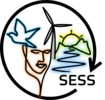

HealthyLand (AGRITECH) - Implementation of models and methodologies to support the management of biological threats and fertilization, and the development of the related geospatial platform
PERA (EFSA) - Advancing the ERA of Plant Protection Products towards a system-based approach
EcoMetric (GUDP) - Building a framework for developing a dynamic metric to measure farmland biodiversity in a spatio-temporally changing landscape
PollinERA (HE) - Understanding pesticide-Pollinator interactions to support EU Environmental Risk Assessment and policy
SYBERAC (HE) - Towards a SYstems-Based, holistic Environmental Risk Assessment of Chemicals
Delivering the underpinning science, methods and tools that can support a transition of terrestrial chemical risk assessment into a systems-based environmental risk assessment designed to protect genetic and functional diversity and ecosystem services.
BETTER-B (HE) - Improving Bees' Resilience to Stressors by Restoring Harmony and Balance
BFOOD-DK (LBST) - Documentation of flower resource availability and optimization of location and density of honey bee hives in Denmark
Enhancing the understanding of floral resource use by honey bees in Danish landscapes, and inventigating options for optimizing the availability of resources (pollen and nectar) through the location and density of bee colonies.
Organic+ (GUDP) - Demonstrating and improving the benefit of organic farming on biodiversity and the environment
Next generation flower strips (DEPA) - Next generation flower strips: crop-tailored mixtures for IPM and pollinators
MUSBERA (DEPA) - Implementation and communication of a MUltiple-Stressor Bee Environmental Risk Assessment
BatPER (DEPA) - Bat pesticide exposure risk in agricultural settings
SESS engages in several ongoing projects on national and international scale. The team collaborates with elite university partners, environmental proctection agencies and authorities, as well as skilled enterprises, consultancies and NGOs.
SESS takes part in projects funded by Danish and other national agencies and funding bodies, The European Food and Safety Authority (EFSA), and European Commission programmes as Horizon 2020 and Horizon Europe.